|
April 17, 2020
The
Right to Education During the Pandemic
Teachers
and Education Workers
Sorting Out What Is What
- Laura
Chesnik -
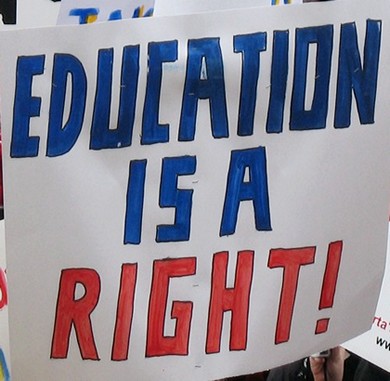 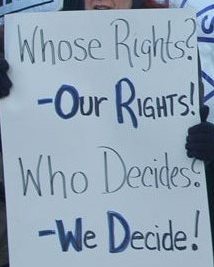 
• What
Criteria Should Determine Whether
Schools Reopen
or Not? - Geneviève Royer
• Education Is a Right
Podcast Episodes on Education and the
COVID-19 Pandemic
The Right
to Housing During the Pandemic
• Decent and Affordable
Housing Is Required to Ensure the Health and
Safety of All
• Housing Rights
Organizations Speak Out
• Call for Immediate
Action to House All Unhoused BC Residents
• Housing, Front Line
Defence Against COVID-19, Says United Nations
Special Rapporteur
The Right to Education
During the Pandemic
- Laura Chesnik -
Teachers and education workers across Canada,
like
others around the world, have been thrust into a
new environment for
teaching as a result of the closure of schools
to curb the spread of
COVID-19. Moving classes online has now become
the norm at all grade
levels. A big problem is that teachers and
education workers want to
work out
how to affirm the right to education under the
circumstances but are
blocked from doing so because they are not being
given a real say in
how things proceed. Instead, they are told just
to be flexible and
accommodating, which translates into not
speaking up when there are
problems or just being critics of what is
imposed on them from school
boards or provincial governments. Teachers and
education workers are
the most flexible and accommodating when it
comes to ensuring their
students get the education they require.
However, this does not
translate into accepting measures that harm
their own working
conditions that they know are students' learning
conditions.
 It is a challenge
under the circumstances to have discussion on
what is taking place. One
issue is to have our own perspective so as not
to get overwhelmed by
all the emphasis on technology and competing
companies all vying to be
used for delivering education in hopes of coming
out on top. Each
province, and even each school board, has
different content delivery systems they use. As
a result, there is not
a common approach nor any intention to have one.
From one school to the
next, the approaches are different. There are
also the many education
related "apps" -- that are now free in many
cases -- that are pushing
to get everyone to sign up and use them in hopes
of becoming the
next big thing. It is a challenge
under the circumstances to have discussion on
what is taking place. One
issue is to have our own perspective so as not
to get overwhelmed by
all the emphasis on technology and competing
companies all vying to be
used for delivering education in hopes of coming
out on top. Each
province, and even each school board, has
different content delivery systems they use. As
a result, there is not
a common approach nor any intention to have one.
From one school to the
next, the approaches are different. There are
also the many education
related "apps" -- that are now free in many
cases -- that are pushing
to get everyone to sign up and use them in hopes
of becoming the
next big thing.
A major issue of concern for teachers and
education workers is how to ensure that those
youth with special needs
in the classroom or challenging personal
situations are not permitted
to fall through the cracks in these
circumstances where they lack the
resources they require to participate in
education. The reality of
moving to online learning in
one fell swoop without an organized plan to
ensure that all students,
teachers and education workers have the
infrastructure they require so
that they can fully participate in the process,
was largely left up to
individuals and to chance. When governments
declared the
closing of schools, things had not been put in
place to guarantee all
families had the necessary equipment, in the
quantities they require,
and adequate internet and technology know-how to
navigate this new
"classroom" space, let alone guarantee that
families had the necessary
supports for difficult personal or financial
situations where basic
needs were already tenuous before schools were
closed.
Students in Grade 12 have been put into
additionally challenging situations during their
graduating year.
Universities in Ontario, for example, continue
to demand mid-term marks
by April 20 to determine initial admission
offers. However, this is an
unrealistic demand, given that marks would only
reflect in-class work
up until March 13.
Students and educators are concerned that the
current situation will
exacerbate the fact that students with greater
resources and supports
will have better chances to get into
universities of their choice. How
to affirm the right to education under the
circumstances is not so
straightforward. For example, should students be
given a pass/fail
mark? How
does this affect getting into post-secondary
education?
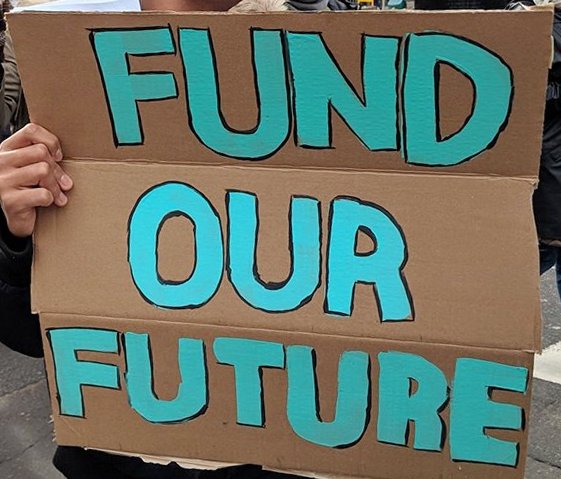 The starting
point of sorting out any of these problems must
be that education is a
right, not a competition to divide society.
Investments are required to
ensure all youth continue to advance in their
education and get the
formation they require to make a contribution to
society. First and
foremost, this means investments in having more
teachers
and education workers to support the system as
teachers, tutors and
teaching assistants and others who provide
specialized supports to
students with high needs so that everyone can be
supported under the
circumstances. It also means teachers and
education workers empowering
themselves to put forward solutions that uphold
the right to education
in practice. The starting
point of sorting out any of these problems must
be that education is a
right, not a competition to divide society.
Investments are required to
ensure all youth continue to advance in their
education and get the
formation they require to make a contribution to
society. First and
foremost, this means investments in having more
teachers
and education workers to support the system as
teachers, tutors and
teaching assistants and others who provide
specialized supports to
students with high needs so that everyone can be
supported under the
circumstances. It also means teachers and
education workers empowering
themselves to put forward solutions that uphold
the right to education
in practice.

- Geneviève Royer
-
Schools in Quebec in what is referred to as
the
public education
system have been closed since March 13. The
nearly 105,000 teachers
employed by school boards (now service centres)
went into action right
away to help curb the pandemic and participate
in or initiate online
activities to interact with their students,
provide school lessons,
respond to parents' questions, organize solo
improvs and online music
lessons, and so much more.
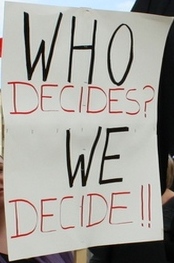 On April 10,
without any consultation with teachers and their
union
organizations, Premier François Legault launched
a trial
balloon to the
effect that schools could reopen before May 4.
This is the practice of
launching a measure that workers have had no
input in, then changing
position if it is deemed unacceptable, while
keeping the same
goal in mind. That explains why Premier Legault
tweeted that same day:
"I repeat that any opening of schools will be
done with the agreement
of Public Health. We won't rush into any
decision." On April 10,
without any consultation with teachers and their
union
organizations, Premier François Legault launched
a trial
balloon to the
effect that schools could reopen before May 4.
This is the practice of
launching a measure that workers have had no
input in, then changing
position if it is deemed unacceptable, while
keeping the same
goal in mind. That explains why Premier Legault
tweeted that same day:
"I repeat that any opening of schools will be
done with the agreement
of Public Health. We won't rush into any
decision."
It's unacceptable, to say the least, that such
bombs are dropped
within this period of intense stress. To then
reduce the issue of
whether schools will be reopened to a matter of
whether or not Public
Health is in agreement, while each and every day
we are confronted with
the fact that basic public health criteria
cannot be applied in the
CHSLDs
(residential and long-term care centres) due to
a lack of personnel,
inspires no confidence at all about things
having been taken in hand.
Neither Legault, the Director of Public Health
nor the Minister of
Health and Social Services have enumerated the
measures taken in
schools since they were closed, or those to be
taken once they reopen.
So it
comes as no surprise that a petition asking that
schools not reopen for
several weeks, launched on April 10, was signed
by over 185,000 people
in four days.
Measures must therefore be taken to ensure the
health of education
workers and their students. Working in a school
comes with an entire
range of social interaction for teachers,
students, secretaries,
security guards, educators, workers and
caretakers, librarians,
cafeteria staff, etc. All these people, even
before setting foot in the
schools each
morning, have been in contact with other people.
Teachers and their colleagues are also
reflecting
upon their return
to the classroom. One of the pandemic's lessons
for them is that
there's no going back to the status quo.
Teachers have been holding up
the public education system for over 20 years.
They are taking up their
social responsibility and demanding a say in the
conditions required so
that schools can be reopened.
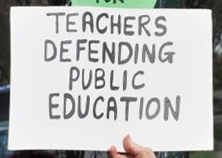 It must be
remembered that the crisis in the education
system
predates the pandemic. For years teachers have
been asking for a
reduction in the student-to-teacher ratio, that
the number of hours
worked by nurses, social workers, psychologists
and other educators,
including those devoted to cleaning and
sanitation, be sufficient in
each school to
respond to the needs of students. Such demands,
in addition to creating
an atmosphere that supports mental health, are
now seen to help prevent
the transmission of infections. It must be
remembered that the crisis in the education
system
predates the pandemic. For years teachers have
been asking for a
reduction in the student-to-teacher ratio, that
the number of hours
worked by nurses, social workers, psychologists
and other educators,
including those devoted to cleaning and
sanitation, be sufficient in
each school to
respond to the needs of students. Such demands,
in addition to creating
an atmosphere that supports mental health, are
now seen to help prevent
the transmission of infections.
People frequenting schools have witnessed and
fallen prey to a
deterioration in public hygiene during the more
than 20 years of the
anti-social offensive. Examples can be cited,
such as the presence of
lead in tap water, of mold, of the uncertainty
about air quality, etc.
This, coupled with the decrease in the number of
hours allocated for
maintenance renders schools fertile ground for
the spread of disease.
In 2015, for example, the Ministry of Health and
Social Services
published the criteria for the maintenance of
school surfaces and
objects, such as that desks, work tables, shared
computer keyboards and
mice must be cleaned at the end of each day.[1]
The reality is that in many of the schools,
classroom desks are only
cleaned once a year and computer equipment only
slightly more often!
Even more worrisome is the fact that neither the
Minister of Health nor
the Director of Public Health in Quebec
exercised their authority, on
April 10 or since, to inform the population
about what they intended to do to ensure that
the requirements for
hygiene and social distancing take a practical
form in schools.
Mr. Legault, by reopening schools, you are
declaring that education
workers are essential workers. Fine! Then be
advised that teachers will
not in any way place their health and that of
their families at risk.
Based on the premise that teachers and other
school staff must be at
the heart of the conditions for the reopening of
schools, here are some
steps that must be taken to be consistent and
responsible in this
period of the pandemic:
- Social distancing measures: there are
1,210,699
students spread
out over 2,725 Quebec public education
institutions. This represents an
average of 444 students per establishment.
Elementary schools have up
to 1,600 students, and high schools as many as
2,700. This does not
take into account the teaching and non-teaching
staff working in
these schools. Therefore, human and physical
resources must be
considered to ensure that the two-metre
separation is respected.
- Different schedules so that there are fewer
students in classrooms
(with everyone separated by an empty desk) and
circulating throughout
the school. Encourage the setting up of a
sanitary station at the
school's entrance through one door and the exit
at a separate door;
- Application of public hygiene measures:
presence
of maintenance
personnel with adequate equipment for each
classroom, as sinks are only
available in washrooms;
- Psychological support for students, as our
students have been
under stress for months and they must have
access to resource persons
on site;
- Providing information in the language of our
recently arrived immigrant students;
- Regular screening tests for education workers
and students;
- Access to child care for school personnel;
- Provision of measures for public transit, as
ridership will
increase. The same goes for adapted
transportation for students with a
disability.
Geneviève Royer is a leader of
the Marxist-Leninist Party of Quebec (PMLQ)
and has been a high school
teacher for over 25 years.
Note
1. Prévention
et
contrôle
des infections dans les services de garde et
écoles du Québec
- annexe 4, MSSS [Infection Prevention and
Control in Quebec
Daycares
and Schools - Appendice 4, MSSS, French only]


Using the internet and social media, teachers
and
education workers are working to organize
themselves, find their
bearings and establish their own frames of
reference for how to
proceed. As things unfold, they are working out
how to intervene to
ensure that matters are resolved in favour of
the right to education.
The podcast Education Is a Right has published
six
episodes dealing specifically with how teachers
and education workers
are orienting themselves to implement online
learning and how to affirm
their rights to proper wages and working
conditions under the
circumstances. The podcast is also informing its
audience about how
other countries
such as China have dealt with the pandemic in
education to contribute
to working out what is what here.
To listen to the podcasts, click here.

The Right to Housing During
the Pandemic
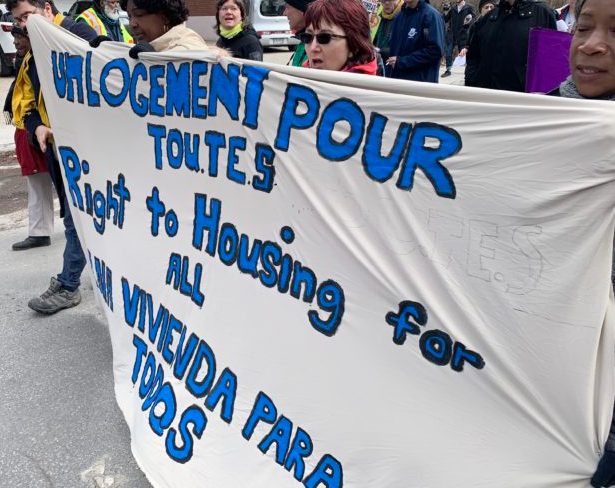 Quebec
Premier Legault during his daily press briefing
on March 25, addressed
the issue of rents due on April 1. He said that
he was open to quick
suggestions for households struggling to pay
their groceries and that
are worried about rent payments. He asked
tenants to ensure they
contact their landlords to make an arrangement,
and called
on landlords to "show understanding." Quebec
Premier Legault during his daily press briefing
on March 25, addressed
the issue of rents due on April 1. He said that
he was open to quick
suggestions for households struggling to pay
their groceries and that
are worried about rent payments. He asked
tenants to ensure they
contact their landlords to make an arrangement,
and called
on landlords to "show understanding."
It's no secret that even before the pandemic
there
was a huge lack of affordable, sanitary and
accessible housing in many
Quebec cities. For years, housing rights
organizations have been
reporting the low vacancy rate and the
abandonment of social housing
construction by governments. Nearly 457,500
tenant households already
spend more
than the standard 30 per cent of their income on
rent, including
195,645 who spend over 50 per cent. With the
pandemic, a loss of
employment could result in finding oneself on
the street.
The Premier's statement in no way addresses the
concerns of organizations and families who are
asking for concrete
arrangements with regard to rent payments. This
issue cannot be left to
the whims of landlords. Knowing that a
significant number of Montreal
dwellings, amongst other properties, are owned
by large private real
estate firms,
that these landlords are unreachable and that
the only person a tenant
can talk to is often a janitor, who is there to
apply the guidelines
they have been given in order to keep their job,
the government's
response must be a very different one. Within
the context of the
pandemic, the confinement period and massive job
losses, measures must
be taken
on a national scale so that no one is left on
their own, and to ensure
that all Quebec tenants are protected. It's a
matter of taking
responsibility so that no one has to put their
health at risk as a
result of financial difficulties, or that they
must choose between
feeding their family, taking care of them or
paying their rent.
Having decent, sanitary and affordable housing
is
part of the necessary living conditions required
to take care of one's
family and children. When over 30 per cent of
income is spent on rent,
one's living conditions are unsustainable.

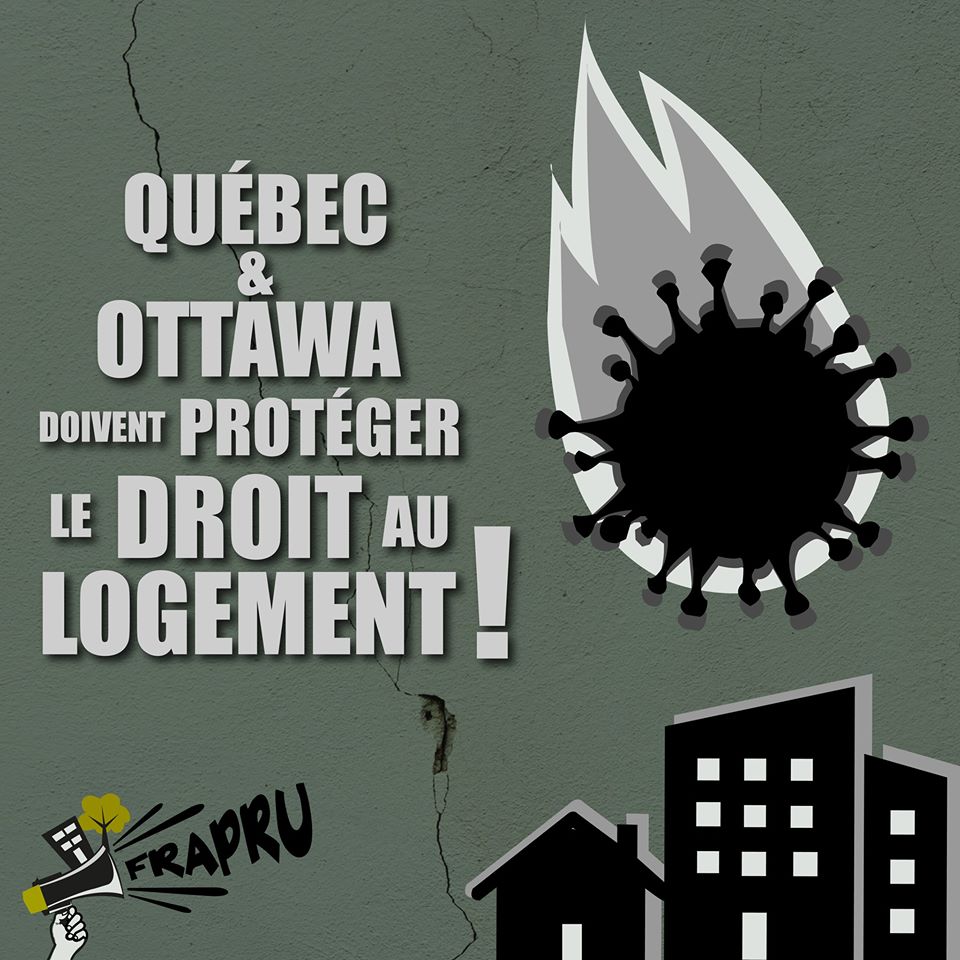 Since the end of
March, various advocacy organizations have
proposed concrete measures
to help tenant households unable to pay the next
few months' rent. They
have not accepted Premier Legault's response
asking that landlords be
"understanding" towards tenants who could not
pay their rent on April 1
nor will not be able to do so on
May 1 either. Such arrangements cannot be left
in the hands of
individuals, as there are many numbered
companies in the real estate
business that would be reluctant about waiting
for rent payments, they
say. They are calling upon the government to
take action. Since the end of
March, various advocacy organizations have
proposed concrete measures
to help tenant households unable to pay the next
few months' rent. They
have not accepted Premier Legault's response
asking that landlords be
"understanding" towards tenants who could not
pay their rent on April 1
nor will not be able to do so on
May 1 either. Such arrangements cannot be left
in the hands of
individuals, as there are many numbered
companies in the real estate
business that would be reluctant about waiting
for rent payments, they
say. They are calling upon the government to
take action.
The Front d'action populaire en
réaménagement urbain (FRAPRU), which has been
active for over 40 years in defence of the right
to housing, has put
forward the following demands for Quebec
government action:
- prohibit any eviction attempt as a result of
non-payment of rent for April 2020 (as well as
for each additional
month declared as a health emergency);
- more broadly, suspend all hearings at the
Régie du logement (rental board) as well as the
enforcement
of decisions leading to the eviction of tenants,
until confinement
measures are lifted and tenants are again able
to pay their rent;
- extend by one month the period available to
tenants to respond to their lease renewal
notice;
- consider that all existing leases be extended
for a period corresponding to at a minimum the
duration of the health
emergency;
- establish an emergency rent supplement
program
for low-income tenant households.
Regarding the federal government, FRAPRU goes
on
to say that "For its part, the Trudeau
government should:
- establish a special emergency fund to assist
tenants unable to pay all or part of their rent;
- provide the money needed for the repair of
existing social housing units funded in the past
by (the federal)
government that are currently boarded up because
of the state of their
disrepair."
The federation of Quebec seniors FADOQ, which
represents more than 535,000 people over the age
of 50, also expressed
its concerns on April 3 about the rent increases
imposed on seniors
living in private seniors' residences (RPPs). It
is calling for "all
rent increase notices to be postponed to a later
date [and] that no
incidental fees be
charged to seniors living in RPPs related to
preventive measures to
curb the spread of COVID-19."
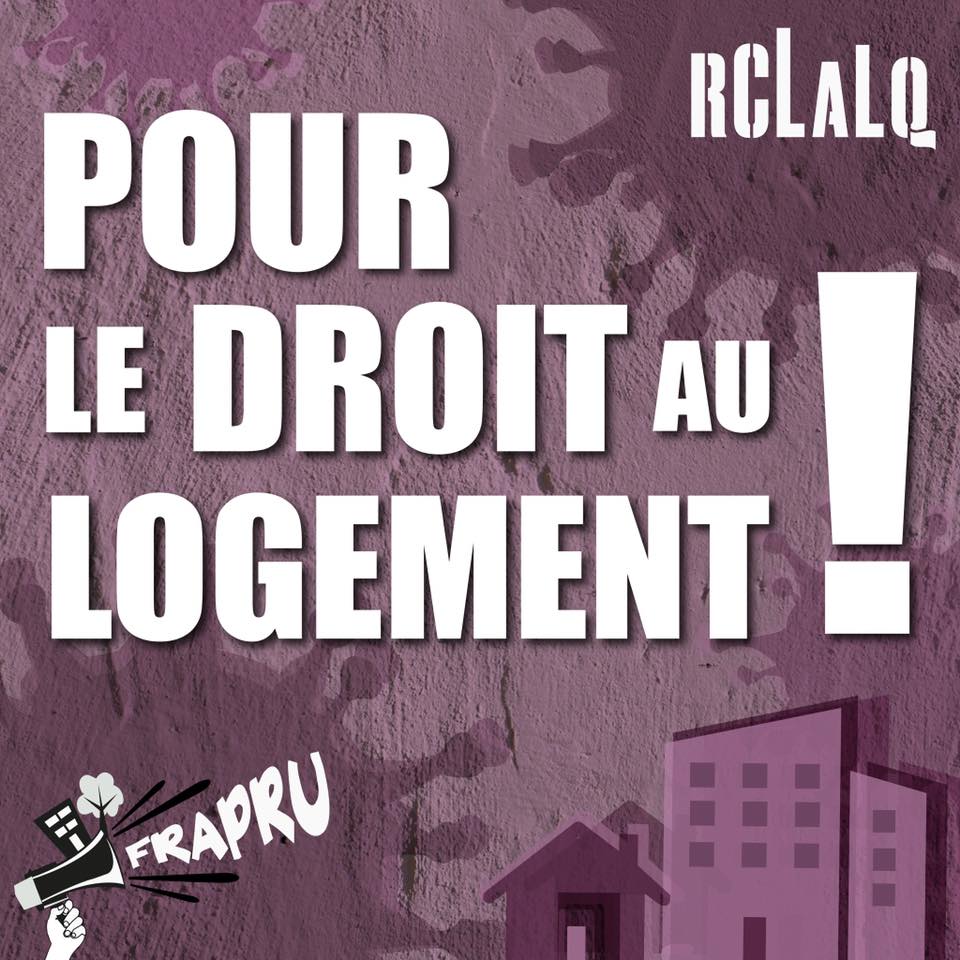 "We've received
numerous
reports from our members about this. [...] The
current situation means
that tenants cannot get in-person assistance
from CAAPs [Quebec
complaint support and accompaniment centres],
said FADOQ Network
President Gisèle Tassé-Goodman. "We've received
numerous
reports from our members about this. [...] The
current situation means
that tenants cannot get in-person assistance
from CAAPs [Quebec
complaint support and accompaniment centres],
said FADOQ Network
President Gisèle Tassé-Goodman.
On April 1, a letter signed by 34 lawyers and
law
students published in the newspaper Le Droit
stressed that the defence of human dignity is at
the heart of these
demands:
"For the reasons listed and in light of
elementary
considerations of human dignity, we, the
undersigned jurists, lawyers
and law students, are asking for a cancellation
of rents directly
affected by the health crisis, at least for
April and May 2020, as well
as material or financial assistance measures
that will allow everyone
-- tenants and landlords
alike -- to provide themselves with the goods
necessary for living and
so that they are not penalized at the end of the
crisis as a result of
having cumulatively defaulted on payments."
"We feel that it would be advantageous for the
context to be used for the emergence of lasting
and sustainable
solutions to a housing crisis and the chronic
precariousness of tenants
that predates the pandemic. Rising to the
occasion also means showing
political courage and laying the foundations for
a fairer society in
the long term," the
lawyers, jurists and law students added.

A number of organizations that advocate on
behalf
of people who are homeless and extremely
vulnerable in the face of the
COVID-19 pandemic, wrote to BC provincial
government Ministers, BC
Housing & the Vulnerable Populations Working
Group, British
Columbia Mayors and Councillors, and British
Columbia Chief Health
Officer
Bonnie Henry on April 9. In the letter they
outlined their demands for
emergency housing for "all unhoused and
inadequately housed residents
in British Columbia."
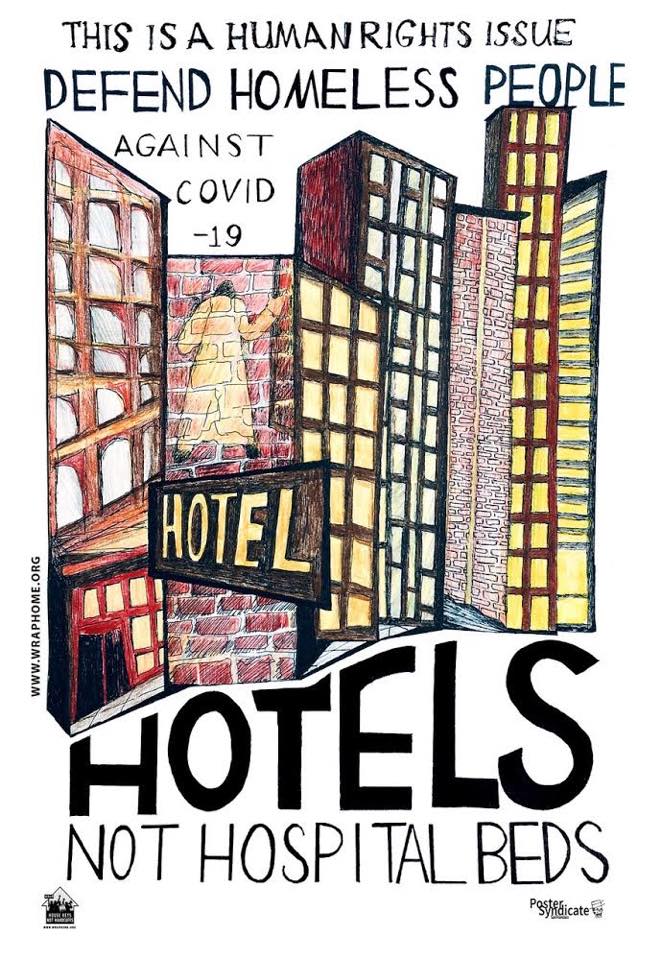 The letter reads,
in part: The letter reads,
in part:
"We write to
request immediate action to address the threat
of COVID-19 for people
who are unhoused and inadequately housed in
British Columbia. The
important actions to date are simply not
sufficient to protect the
health and safety of people who are unable to
engage in physical
distancing or self-isolation for lack of
self-contained
housing.
"The UN Special Rapporteur on the right to
adequate
housing calls the refuge of a home the 'front
line defence' against
COVID-19. Public health directives across Canada
are clear that 'staying home' is the primary way to protect
both personal and public
health in this epidemic. As you are well-aware,
for those who have been
denied access to
basic housing, income, and social supports --
these directives are
impossible to follow."
In reference to actions taken by the provincial
government to date, the advocates point out that
"since the start of
this emergency the Province has only acquired
some 900 spaces for
unhoused people to physical-distance,
self-isolate and quarantine --
this when we know there is a bare minimum of
7,655 unhoused people in
BC. What's more,
the Provincial Government acknowledges 'more
rooms have been
identified' but they will only use them 'if a
need is identified by
health authorities.' It is unconscionable that
any emergency housing is
being held in reserve during this critical
moment." They call for rapid
action to house every unsheltered and
inadequately housed resident of
British Columbia.
Specifically, the letter asks Selina Robinson,
Minister of Municipal Affairs and Housing, as
well as the Premier and
Mayors and Councilors throughout the province
"to take decisive action
now to adequately house those existing in street
homelessness,
encampments, shelters, poorly maintained SRO's
and overcrowded reserve
housing." They
point out that "those living in encampments,
inadequate housing such as
SROs [single room occupancies], in shelters and
on the streets in BC
know they have been abandoned thus far. Fear,
anger, panic and
misinformation has set in. We ask that you take
decisive action in BC
and Vancouver by mustering all available
resource to ensure the most
vulnerable in our communities do not succumb to
COVID-19. The time for
uncompromising leadership on homelessness is
critical now more than
ever. Please ensure we do not fail unhoused
residents of British
Columbia."

People have taken over a Surrey
community centre to emphasize the need
for public buildings to be used for the
homeless.
|
The letter points out that provincial and
municipal authorities have the power to "acquire
and use public and/or
private property as required to prevent the
spread of COVID-19" but
that these powers "are not being utilized as
they should be to permit
unsheltered and under-housed people to properly
physical-distance,
self-isolate and quarantine
at this time. It is time to take the decisive
action emergency
legislation allows and seize the housing. [...]
The only adequate,
human rights-based approach enables full access
to the true physical
distancing, self-isolating and access to
sanitation our top health
officials strongly urge for every citizen.
Crowded SROs and
'petri-dish' shelters with
shared bathrooms and showers do not provide
access to adequate
sanitation and leaves occupants and workers at
great risk. Removing
individuals from crowded shelter and housing
stock after they develop
symptoms is too little too late and undermines
both individual and
public rights and safety."
The letter calls on all levels of government to
act quickly and decisively, including, and
specifically to:
"Provide self-contained hotel, motel or other
rooms with toilets, showers, sinks and beds for
every individual that
wants to move from the streets, encampments,
shelters and inadequate
housing including SROs and crowded reserve
housing, and begin long term
housing planning for all those who are
temporarily housed.
"Ensure the number of units accounts for the
overflow of women, trans and gender
non-conforming people, and children
escaping domestic violence during COVID-19;
temporary foreign works and
others with precarious immigration status; those
who may be released
from overcrowded and dangerous detention centres
during this time.
"Delivery of three healthy meals daily to every
room to allow people to physical distance and
self-isolate as required.
"Delivery of needed safe supply including
alcohol
to anyone who requires it daily.
"Regular cleaning services and access to
hygiene
supplies as required.
"Adequate PPE, training and safety measures for
all hotel, social services and other support
staff working to support
community members housed in the hotel stock.
"For those who are unable to move inside,
whether
because there is insufficient shelter, or
available shelter is
inaccessible to their needs, support people to
'space out' through
empty park and greenspace assets through-out the
province without risk
of removal or persecution."
The letter is signed by:
Leslie Varley, Executive Director, BC
Association
of Aboriginal Friendship Centres
Viveca Ellis, Interim Community Organizer, BC
Poverty Reduction
Coalition
Fiona York, Coordinator, Carnegie Community
Action Project
Anna Cooper, Staff Lawyer -- Homelessness, Pivot
Legal Society

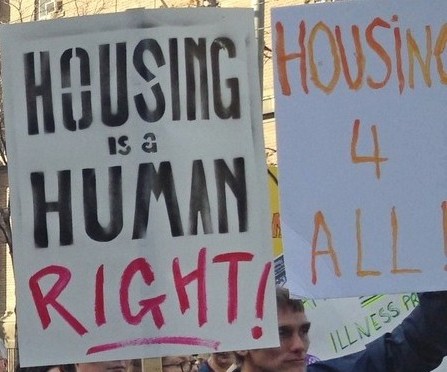 Leilani Farha,
the UN Special Rapporteur on the
right to adequate housing, published an article
on the organization's
website on March 18, citing the responsibilities
of governments and
states to curb the pandemic. They must, in
particular: Leilani Farha,
the UN Special Rapporteur on the
right to adequate housing, published an article
on the organization's
website on March 18, citing the responsibilities
of governments and
states to curb the pandemic. They must, in
particular:
"cease all evictions; provide emergency housing
with services for those who are affected by the
virus and must isolate;
ensure that the enforcement of containment
measures (eg: curfews) does
not lead to the punishment of anyone based on
their housing status;
provide equal access to testing and health care;
and provide adequate
housing which
may require the implementation of extraordinary
measures as appropriate
in a state of emergency, including using vacant
and abandoned units and
available short-term rentals.
"With respect to those facing job loss and
economic hardship, States must: provide direct
financial assistance for
or defer rental and mortgage payments; enact a
moratorium on evictions
due to arrears; introduce rental stabilization
or reduction measures;
and, at least for the duration of the pandemic,
suspend utility costs
and surcharges."
She also stressed the danger that private
interests may pose in the fight against
COVID-19: "Measures are being
introduced and significant resources allocated
to mitigate against the
economic downturn caused by COVID-19, such as
lowering interest rates.
There is a risk that such measures will enable
global financial actors
to use the pandemic
and the misfortunes of many to dominate housing
markets without regard
for human rights standards, as they did in the
aftermath of the 2008
global financial crisis [...] States must
prevent the predatory
practices of institutional investors in the area
of residential real
estate."
She concludes by saying, "By ensuring access to
secure housing with adequate sanitation, States
will not only protect
the lives of those who are homeless or living in
informal settlements
but will help protect the entire world's
population by flattening the
curve of COVID-19."

(To access articles
individually click on the black headline.)
PDF
PREVIOUS
ISSUES | HOME
Website:
www.cpcml.ca
Email: office@cpcml.ca
|



 It is a challenge
under the circumstances to have discussion on
what is taking place. One
issue is to have our own perspective so as not
to get overwhelmed by
all the emphasis on technology and competing
companies all vying to be
used for delivering education in hopes of coming
out on top. Each
province, and even each school board, has
different content delivery systems they use. As
a result, there is not
a common approach nor any intention to have one.
From one school to the
next, the approaches are different. There are
also the many education
related "apps" -- that are now free in many
cases -- that are pushing
to get everyone to sign up and use them in hopes
of becoming the
next big thing.
It is a challenge
under the circumstances to have discussion on
what is taking place. One
issue is to have our own perspective so as not
to get overwhelmed by
all the emphasis on technology and competing
companies all vying to be
used for delivering education in hopes of coming
out on top. Each
province, and even each school board, has
different content delivery systems they use. As
a result, there is not
a common approach nor any intention to have one.
From one school to the
next, the approaches are different. There are
also the many education
related "apps" -- that are now free in many
cases -- that are pushing
to get everyone to sign up and use them in hopes
of becoming the
next big thing. The starting
point of sorting out any of these problems must
be that education is a
right, not a competition to divide society.
Investments are required to
ensure all youth continue to advance in their
education and get the
formation they require to make a contribution to
society. First and
foremost, this means investments in having more
teachers
and education workers to support the system as
teachers, tutors and
teaching assistants and others who provide
specialized supports to
students with high needs so that everyone can be
supported under the
circumstances. It also means teachers and
education workers empowering
themselves to put forward solutions that uphold
the right to education
in practice.
The starting
point of sorting out any of these problems must
be that education is a
right, not a competition to divide society.
Investments are required to
ensure all youth continue to advance in their
education and get the
formation they require to make a contribution to
society. First and
foremost, this means investments in having more
teachers
and education workers to support the system as
teachers, tutors and
teaching assistants and others who provide
specialized supports to
students with high needs so that everyone can be
supported under the
circumstances. It also means teachers and
education workers empowering
themselves to put forward solutions that uphold
the right to education
in practice.
 It must be
remembered that the crisis in the education
system
predates the pandemic. For years teachers have
been asking for a
reduction in the student-to-teacher ratio, that
the number of hours
worked by nurses, social workers, psychologists
and other educators,
including those devoted to cleaning and
sanitation, be sufficient in
each school to
respond to the needs of students. Such demands,
in addition to creating
an atmosphere that supports mental health, are
now seen to help prevent
the transmission of infections.
It must be
remembered that the crisis in the education
system
predates the pandemic. For years teachers have
been asking for a
reduction in the student-to-teacher ratio, that
the number of hours
worked by nurses, social workers, psychologists
and other educators,
including those devoted to cleaning and
sanitation, be sufficient in
each school to
respond to the needs of students. Such demands,
in addition to creating
an atmosphere that supports mental health, are
now seen to help prevent
the transmission of infections.

 Quebec
Premier Legault during his daily press briefing
on March 25, addressed
the issue of rents due on April 1. He said that
he was open to quick
suggestions for households struggling to pay
their groceries and that
are worried about rent payments. He asked
tenants to ensure they
contact their landlords to make an arrangement,
and called
on landlords to "show understanding."
Quebec
Premier Legault during his daily press briefing
on March 25, addressed
the issue of rents due on April 1. He said that
he was open to quick
suggestions for households struggling to pay
their groceries and that
are worried about rent payments. He asked
tenants to ensure they
contact their landlords to make an arrangement,
and called
on landlords to "show understanding." Since the end of
March, various advocacy organizations have
proposed concrete measures
to help tenant households unable to pay the next
few months' rent. They
have not accepted Premier Legault's response
asking that landlords be
"understanding" towards tenants who could not
pay their rent on April 1
nor will not be able to do so on
May 1 either. Such arrangements cannot be left
in the hands of
individuals, as there are many numbered
companies in the real estate
business that would be reluctant about waiting
for rent payments, they
say. They are calling upon the government to
take action.
Since the end of
March, various advocacy organizations have
proposed concrete measures
to help tenant households unable to pay the next
few months' rent. They
have not accepted Premier Legault's response
asking that landlords be
"understanding" towards tenants who could not
pay their rent on April 1
nor will not be able to do so on
May 1 either. Such arrangements cannot be left
in the hands of
individuals, as there are many numbered
companies in the real estate
business that would be reluctant about waiting
for rent payments, they
say. They are calling upon the government to
take action. "We've received
numerous
reports from our members about this. [...] The
current situation means
that tenants cannot get in-person assistance
from CAAPs [Quebec
complaint support and accompaniment centres],
said FADOQ Network
President Gisèle Tassé-Goodman.
"We've received
numerous
reports from our members about this. [...] The
current situation means
that tenants cannot get in-person assistance
from CAAPs [Quebec
complaint support and accompaniment centres],
said FADOQ Network
President Gisèle Tassé-Goodman. The letter reads,
in part:
The letter reads,
in part:
 Leilani Farha,
the UN Special Rapporteur on the
right to adequate housing, published an article
on the organization's
website on March 18, citing the responsibilities
of governments and
states to curb the pandemic. They must, in
particular:
Leilani Farha,
the UN Special Rapporteur on the
right to adequate housing, published an article
on the organization's
website on March 18, citing the responsibilities
of governments and
states to curb the pandemic. They must, in
particular: